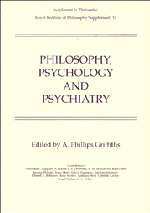Book contents
- Frontmatter
- Contents
- Preface
- Introduction: Just Getting Started
- Mind and Madness: New Directions in the Philosophy of Psychiatry
- Emotion and Memory: The Second Cognitive Revolution
- Meaning and Mechanism in Psychotherapy and General Psychiatry
- Making Sense on the Boundaries: On Moving Between Philosophy and Psychotherapy
- Mental Disorder, Illness and Biological Disfunction
- Integrity, Boundary and the Ecology of Personal Processes
- Multiple Personality and Computational Models
- Psychology and Politics: Lies, Damned Lies and Self-Deception
- Personal Identity and Psychiatric Illness
- Vices and the Self
- Wild Beasts and Idle Humours: Legal Insanity and the Finding of Fault
- Dangerousness and Mental Disorder
- Problems with the Doctrine of Consent
- Homosexuality
- Nietzsche and Music
- References
- Notes on Contributors
Integrity, Boundary and the Ecology of Personal Processes
Published online by Cambridge University Press: 03 May 2011
- Frontmatter
- Contents
- Preface
- Introduction: Just Getting Started
- Mind and Madness: New Directions in the Philosophy of Psychiatry
- Emotion and Memory: The Second Cognitive Revolution
- Meaning and Mechanism in Psychotherapy and General Psychiatry
- Making Sense on the Boundaries: On Moving Between Philosophy and Psychotherapy
- Mental Disorder, Illness and Biological Disfunction
- Integrity, Boundary and the Ecology of Personal Processes
- Multiple Personality and Computational Models
- Psychology and Politics: Lies, Damned Lies and Self-Deception
- Personal Identity and Psychiatric Illness
- Vices and the Self
- Wild Beasts and Idle Humours: Legal Insanity and the Finding of Fault
- Dangerousness and Mental Disorder
- Problems with the Doctrine of Consent
- Homosexuality
- Nietzsche and Music
- References
- Notes on Contributors
Summary
Some definitions
I shall be employing a number of terms that have a variety of usages as in other contexts. The definitions I shall be using in this article are given below.
Psyche
By this I mean the field of the mind of a human being. It includes conscious and unconscious mental contents, and items which the self endorses and owns; but it also includes items which it does not own, and which are experienced as alien.
Person
This I understand as the centre or epicentre from which the various contents of the psyche appear to emerge, get organised, develop and change. There are many ways in which this happens, but I shall concentrate on two distinctive and complementary functions of the person in this paper: the individuating and the participative. The former crystallises out and separates subjects and objects from experiential life, while the latter unites and reconnects them. On this account a person is an achievement rather than something that is given; there can thus be both pre-personal states of the psyche, and also relatively well developed and relatively undeveloped persons.
Personal integrity
By the above definition persons are processes. The integrity of these processes can then be understood in terms of: (i) the well-connectedness of its parts and functions, (ii) their success in mediating an optimum relationship between self and environment.
- Type
- Chapter
- Information
- Philosophy, Psychology and Psychiatry , pp. 83 - 102Publisher: Cambridge University PressPrint publication year: 1995



